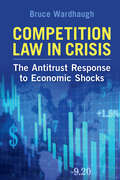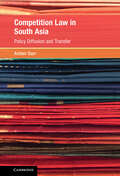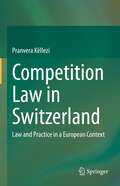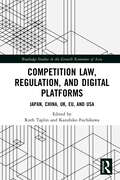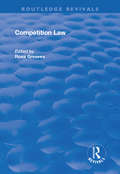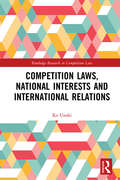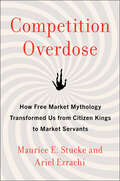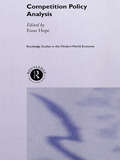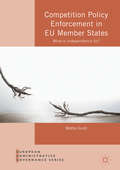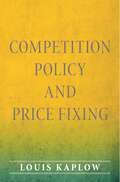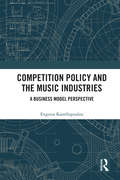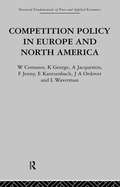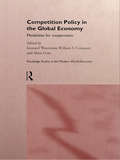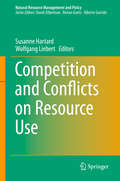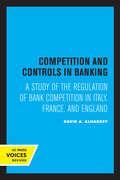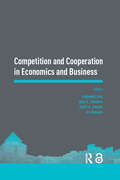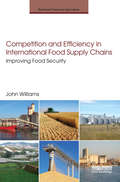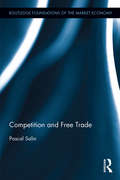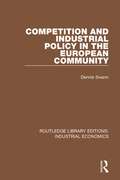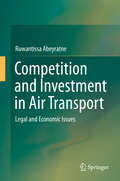- Table View
- List View
Competition Law in Crisis: The Antitrust Response to Economic Shocks
by Bruce WardhaughA common criticism of the competition rules posed by EU authorities is that they are too inflexible, thereby prohibiting adequate responses to economic and industrial shocks. Competition Law in Crisis challenges this suggestion through an examination of competition responses to crises past and present. With an analysis spanning the response of UK and EU competition authorities to the economic and commercial outfall of the 2008 financial crisis, the COVID-19 pandemic, and potential responses to the climate crisis in the context of post-Brexit British industrial policy, the book argues that relaxing the competition regime is precisely the wrong response. The rigidity of competition rules in the UK and EU has both normative and positive implications for not just the methodology used in competition analysis, but also the role of competition law within the legal order of both jurisdictions. The book concludes with a discussion of the place of the competition in the UK's and EU's legal order.
Competition Law in South Asia: Policy Diffusion and Transfer (Global Competition Law and Economics Policy)
by Amber DarrIn the last twenty years, South Asian countries have increasingly engaged with modern competition legislation. Yet, apart from India and Pakistan, the countries in this region have had little success enforcing these laws. Competition Law in South Asia analyses the mechanisms and institutions through which Bangladesh, Bhutan, India, Pakistan, Maldives Nepal, Sri Lanka, and Afghanistan have engaged with modern competition legislation. The book argues that the success (or failure) of competition reform in these countries is inextricably linked to the unique interplay of mechanisms and legal and political institutions through which these countries have engaged with competition legislation. The book provides an in-depth comparative analysis of the adoption and implementation continuum in India and Pakistan, the compatibility and legitimacy generated by the adoption process, and its impact on implementation. Taking a far-reaching, comparative approach, the book draws lessons not only for countries in South Asia but also for emerging economies across the globe.
Competition Law in Switzerland: Law and Practice in a European Context
by Pranvera KëlleziThis is the first comprehensive English-language overview of competition law enforcement in Switzerland since the introduction of direct sanctions in 2004. It discusses the key issues facing practitioners: horizontal and vertical agreements (with a particular emphasis on distribution agreements), abuse of dominance, and the newly introduced provisions on relative market power and merger control. It also provides an overview of the key procedural provisions, leniency and amicable settlements, and fines. The book subsequently analyses the main differences between Swiss and EU competition law and explains why, to what extent, and how companies should conduct a separate analysis under Swiss law. It offers a comprehensive overview and accessible analysis, based on in-depth research of case law, for practitioners and in-house counsels who need to ensure compliance with competition law on a Swiss, European or international basis. It is also a valuable guide for all practitioners, academics and students interested in understanding Swiss competition law. Enforcement of competition law in Switzerland has intensified and is becoming increasingly important for global companies selling in Switzerland. Moreover, the fines have increased over the last twenty years, and many foreign companies have had to pay substantial fines in recent years. Lastly, the Swiss Federal Supreme Court has now extended the extraterritorial application of Swiss competition law to foreign companies where sales to Switzerland are possible.
Competition Law, Regulation and Digital Platforms: Japan, China, UK, EU and USA (Routledge Studies in the Growth Economies of Asia)
by Ruth Taplin Kazuhiko FuchikawaThis book confronts and analyses how competition law in its present form is unable to deal with the new advances in digital technology that have made tech giants not subject to national jurisdictions as they straddle the world, with a particular focus on Japan, China, UK, EU and USA.Demonstrating how the gatekeeping role of digital platforms has broken through the boundaries of national regulation, this book highlights examples where companies have broken and infringed antitrust law with impunity, pursuing self-preferencing and unfair competition practices solely for their own profitability. It also identifies how tech giants can open their digital platforms for fair use by consumers, small and medium enterprises (SMEs), and creators ,while still allowing tech giants to maintain their important role as gatekeepers of digital security that protects users from cyberattacks. This is followed by an examination of the similarities between tech giants and big pharma within the competition law and intellectual property context, revealing how tech giants are beginning to target the healthcare sector.Exploring how intellectual property rights are interwoven through new modernising regulations to curtail the dominance of Big Tech on digital platforms, this book will appeal to students, scholars and practitioners of Business Ethics, Intellectual Property, Law, and Regulation.
Competition Law: Volume Ii (The\library Of Essays On Antitrust And Competition Law Ser.)
by Rosa GreavesThis book was published in 2003. Competition/anti-trust law, as a separate body of law, is very much a creation of the 20th century and grew only in maturity in the latter half of that century. As developments in US anti-trust law have had, and continue to have, an important influence on the development of competition law in Europe and worldwide, articles have been selected for this collection from both sides of the Atlantic. The volume focuses on the following aspects: the objectives and nature of competition law, the scope of competition law, selected legal concepts and challenges in competition law, and the global application of competition law.
Competition Laws, National Interests and International Relations (Routledge Research in Competition Law)
by Ko UnokiMost of the competition laws currently enforced by states aim to protect consumer welfare and promote fair competition by regulating against anti-competitive behavior. Yet, despite the shared objectives, the global community does not have a common global competition law. In exploring the reasons for this, this book takes a unique interdisciplinary approach by using international relations theories to illustrate the relationship between the enforcement of competition laws and international relations through an analysis of competition cases relating to cartels, extraterritoriality, and corporate mergers and acquisitions. Through an examination of this relationship, this book will argue on why the views held by state leaders on the condition of international relations may at times lead them to either arbitrarily over-enforce or disregard their competition laws to the detriment of fair competition and consumer welfare. This book also provides suggestions for global business investors who face competition law issues on how they may accommodate such views.
Competition Overdose: How Free Market Mythology Transformed Us from Citizen Kings to Market Servants
by Ariel Ezrachi Maurice E. StuckeUsing dozens of vivid examples to show how society overprescribed competition as a solution and when unbridled rivalry hurts consumers, kills entrepreneurship, and increases economic inequality, two free-market thinkers diagnose the sickness caused by competition overdose and provide remedies that will promote sustainable growth and progress for everyone, not just wealthy shareholders and those at the top.Whatever illness our society suffers, competition is the remedy. Do we want better schools for our children? Cheaper prices for everything? More choices in the marketplace? The answer is always: Increase competition. Yet, many of us are unhappy with the results. We think we’re paying less, but we’re getting much less. Our food has undeclared additives (or worse), our drinking water contains toxic chemicals, our hotel bills reveal surprise additions, our kids’ schools are failing, our activities are tracked so that advertisers can target us with relentless promotions. All will be cured, we are told, by increasing the competitive pressure and defanging the bloated regulatory state.In a captivating exposé, Maurice E. Stucke and Ariel Ezrachi show how we are falling prey to greed, chicanery, and cronyism. Refuting the almost religious belief in rivalry as the vehicle for prosperity, the authors identify the powerful corporations, lobbyists, and lawmakers responsible for pushing this toxic competition—and argue instead for a healthier, even nobler, form of competition.Competition Overdose diagnoses the disease—and provides a cure for it.
Competition Policy
by Massimo MottaThis is the first book to provide a systematic treatment of the economics of antitrust (or competition policy) in a global context. It draws on the literature of industrial organisation and on original analyses to deal with such important issues as cartels, joint-ventures, mergers, vertical contracts, predatory pricing, exclusionary practices, and price discrimination, and to formulate policy implications on these issues. The interaction between theory and practice is one of the main features of the book, which contains frequent references to competition policy cases and a few fully developed case studies. The treatment is written to appeal to practitioners and students, to lawyers and economists. It is not only a textbook in economics for first year graduate or advanced undergraduate courses, but also a book for all those who wish to understand competition issues in a clear and rigorous way. Exercises and some solved problems are provided.
Competition Policy Analysis (Routledge Studies In The Modern World Economy)
by Einar HopeAs markets become increasingly integrated and globalised, competition policy is facing new challenges. Contributions from leading international experts explore theoretical and methodological issues of practical relevance for the new competition policy order and give examples of practical policy adjustments.
Competition Policy Enforcement in EU Member States: What is Independence for? (European Administrative Governance)
by Mattia GuidiThis book investigates the crucial EU policy of competition, which is enforced by the Commission and by national agencies that enjoy various degrees of autonomy from their governments. More and more policy-making activities are nowadays delegated to agencies that cannot be held accountable to parliaments, and ultimately to voters. The author explains why this is the case in the field of EU competition policy and discusses whether independence is linked to improved enforcement - as theories of delegation and common wisdom would suggest. These questions are explored with an in-depth analysis covering 27 EU countries for 17 years (1993-2009). While the results show that independence is given when countries lack credibility and good reputation, they also point out that autonomy from governments can hardly be associated with improved regulatory output. So, is independence of competition authorities useful to society in the end? This book will appeal to upper-level students and scholars interested in competition policy, regulatory agencies, and European public policy.
Competition Policy and Patent Law under Uncertainty
by Geoffrey A. Manne Joshua D. WrightThe regulation of innovation and the optimal design of legal institutions in an environment of uncertainty are two of the most important policy challenges of the twenty-first century. Innovation is critical to economic growth. Regulatory design decisions and, in particular, competition policy and intellectual property regimes can have profound consequences for economic growth. However, remarkably little is known about the relationship between innovation, competition and regulatory policy. Any legal regime must attempt to assess the trade-offs associated with rules that will affect incentives to innovate, allocative efficiency, competition, and freedom of economic actors to commercialize the fruits of their innovative labors. The essays in this book approach this critical set of problems from an economic perspective, relying on the tools of microeconomics, quantitative analysis and comparative institutional analysis to explore and begin to provide answers to the myriad challenges facing policymakers.
Competition Policy and Price Fixing
by Louis KaplowThroughout the world, the rule against price fixing is competition law's most important and least controversial prohibition. Yet there is far less consensus than meets the eye on what constitutes price fixing, and prevalent understandings conflict with the teachings of oligopoly theory that supposedly underlie modern competition policy. Competition Policy and Price Fixing provides the needed analytical foundation. It offers a fresh, in-depth exploration of competition law's horizontal agreement requirement, presents a systematic analysis of how best to address the problem of coordinated oligopolistic price elevation, and compares the resulting direct approach to the orthodox prohibition. In doing so, Louis Kaplow elaborates the relevant benefits and costs of potential solutions, investigates how coordinated price elevation is best detected in light of the error costs associated with different types of proof, and examines appropriate sanctions. Existing literature devotes remarkably little attention to these key subjects and instead concerns itself with limiting penalties to certain sorts of interfirm communications. Challenging conventional wisdom, Kaplow shows how this circumscribed view is less well grounded in the statutes, principles, and precedents of competition law than is a more direct, functional proscription. More important, by comparison to the communications-based prohibition, he explains how the direct approach targets situations that involve both greater social harm and less risk of chilling desirable behavior--and is also easier to apply.
Competition Policy and the Music Industries: A Business Model Perspective
by Jenny KanellopoulouThis book explores the nature of the music industries before and after the digital revolution from the point of view of the consumer, and explores the question of whether there is a role for competition policy intervention in the music industries. Considering the historically consolidated environment of the music industries, and their rapidly evolving business models in the 21st century, the author argues that there is a need for updated competition design to promote consumer welfare and competition in these markets. Opening a much-needed interdisciplinary dialogue across music studies, business, and law, the book applies business model literature to antitrust law in the context of the music industries. It offers a comprehensive history of encounters between the music industry and antitrust and regulatory authorities in the US, UK, and EU, from the payola scandals of the 1950s to the merger of Live Nation and Ticketmaster in 2010, showing how even as business models in the industry have changed, it has repeatedly moved toward consolidation with little regulation. Drawing on this history, it considers how competition policy can foster innovation and safeguard consumer interests in the music markets of the future. Offering new analytical and methodological tools, this book is relevant to those studying the music industries from business, legal, and cultural perspectives.
Competition Policy in Europe and North America: Economic Issues and Institutions
by George W. Comanor K. Jacquemin A. Jenny F. Kantzenbach E. Ordover L. WavermanFirst Published in 2001. Routledge is an imprint of Taylor & Francis, an informa company.
Competition Policy in the European Union and the Power of Microsoft
by Julio J. Rotemberg Michelle KalkaFocuses on a decision by the European Competition Commissioner Mario Monti about U.S.-based Microsoft Corp. Sun has complained to the commission that Microsoft has installed components in its desktop operating system that only "talk" to Microsoft operating systems for servers. Sun has further complained that Microsoft released information about its operating systems to some partners but not to Sun. The commission has issued a formal complaint, but Monti's decision is still pending at the time of the case. As background for this decision, the case contains information about the U.S. antitrust case against Microsoft, U.S. and European competition laws, and how European lawmakers have dealt with interconnections among IT components in the past.
Competition Policy in the Global Economy: Modalities for Co-operation (Routledge Studies in the Modern World Economy)
by Leonard Waverman William S. Comanor Akira GotoInternational agreements on competition law and policy are notoriously difficult to implement. This collection of essays examines the complexities involved when the issues of international co-ordination and harmonization of competition law and policy are considered.
Competition Simulator Exercise: Questions
by Eric J. Van Den SteenIn the Competition Simulator Exercise, students explore through trial and error some important economic foundations of competitive strategy and managerial economics. In particular, the simulator let students explore horizontal differentiation with and without price setting, strategic complements and substitutes and their implications for commitment and for first-mover advantage, the effect of the number of competitors on the competitiveness of a market, capacity limitations and judo economics, natural monopoly and the effect of market size, technology choice as entry deterrence, endogenous economies of scale, and capacity limitation in commodity markets.
Competition and Conflicts on Resource Use (Natural Resource Management and Policy #46)
by Susanne Hartard Wolfgang LiebertThis book reflects on the causes of resource-based conflicts and competition, and presents solutions for safely and sustainably providing resources with a focus on material flow management. The contributions from different disciplines highlight issues such as safe access to resources, conflicts over water and energy supplies, waste of strategic mineral resources, sustainable resource consumption, and renewable energy technologies.
Competition and Controls in Banking: A Study of the Regulation of Bank Competition in Italy, France, and England
by David A. AlhadeffThis title is part of UC Press's Voices Revived program, which commemorates University of California Press’s mission to seek out and cultivate the brightest minds and give them voice, reach, and impact. Drawing on a backlist dating to 1893, Voices Revived makes high-quality, peer-reviewed scholarship accessible once again using print-on-demand technology. This title was originally published in 1968.
Competition and Cooperation in Economics and Business: Proceedings of the Asia-Pacific Research in Social Sciences and Humanities, Depok, Indonesia, November 7-9, 2016: Topics in Economics and Business
by Lindawati Gani, Beta Y. Gitaharie, Zaäfri A. Husodo & Ari KuncoroAsia and the Pacific have become the growth engine of the world economy with the contribution of two-third of the global growth. The book discusses current issues in economics, business, and accounting in which economic agents, as individuals, entrepreneurs and professionals, as well as countries in the Asia and Pacific regions compete and collaborate with each other and with the rest of the globe. Areas covered in the book include economic development and sustainability, labor market competition, Islamic economic and business, marketing, finance, accounting standard compliances, and taxation. It will help shed light on what business and economic scholars in regions have done in terms of research and knowledge development, as well as the new frontiers of research that have been explored and opening up. This is an Open Access ebook, and can be found on www.taylorfrancis.com.
Competition and Efficiency in International Food Supply Chains: Improving Food Security (Earthscan Food and Agriculture)
by John WilliamsWhy have food crises seemingly become more frequent in recent years, compared to the last few decades? This book examines an array of different issues and distortions that are causing food supply chain dysfunction in many countries, particularly for staple non-perishable foods such as grains, oilseeds, pulses and sugar. It outlines the underlying changes that are currently occurring, which will have an influence on the direction of future food supply chains, and provides some solutions to current food security problems. Based on an analysis of total regulation in the 1950s-60s through to deregulation during the 1980-90s, as well as post-deregulation, it focuses on liberal trade and deregulation as a more successful solution to creating efficiencies in food supply chains and distribution. The author highlights a common thread of either farmers using government for vested-interest intervention, or autocratic governments seeking market and supply-chain power. The book examines the role of government after 70 years of food supply chain intervention. It discusses the role of commercial ‘trade’ markets and cluster industries and how these can quickly disintegrate when price distortions occur. The author studies both food importing and exporting countries and concludes that comingled commoditization of food has led to increased hoarding, corruption, and dependence on food aid. He argues that a competitive food supply chain that has minimum intervention is more likely to provide future food security. In conclusion the book emphasizes that adequate rewards, competition, and striving for supply chain efficiencies are the essences of sustainable food security.
Competition and Firm Productivity: Evidence from Firm-Level Data
by Sandra Ospina Marc SchiffbauerA report from the International Monetary Fund.
Competition and Free Trade (Routledge Foundations of the Market Economy)
by Pascal SalinCompetition and free trade are both concepts which are absolutely central for the understanding of human societies but are also often the subjects of fears and criticisms. It is argued that it is not possible to understand what competition really is without referring to the concept of freedom, and that free trade must be understood as the way to expand the scope of competition. This book uniquely analyses the two concepts as closely interlinked, by approaching them in two parts. The first, ‘Competition’, introduces the reader to the traditional competition model, and explores the dynamics and range of the term in an authoritative way. The second part, ‘Free Trade’ examines the different types of trade, and analyses them in a wealth of contexts, from customs duties to import quotas. With discussions surrounding protectionist arguments, politics, liberalization and history, the author presents an overview of how competition and free trade operate in the real world. This book dispels the fears and misunderstandings which have developed around these central pillars of the modern economy and is essential reading for those studying international economics, international trade, political economy or corporate finance.
Competition and Industrial Policy in the European Community (Routledge Library Editions: Industrial Economics #1)
by Dennis SwannThis book, first published in 1983, is primarily concerned with the economic policies of the European Economic Community and the European Coal and Steel Community. It explains in detail how the common market was established and how it was maintained. Free competition cannot be created merely by removing customs duties and quotas: it is also necessary to attack the many non-tariff barriers which would otherwise impede free movement. Moreover, the Community sought to develop an industrial policy, notably in relation to the ECSC, to provide a stance towards declining industries suffering from Developing World competition.
Competition and Investment in Air Transport: Legal and Economic Issues
by Ruwantissa AbeyratneThis book addresses emerging legal and economic issues in competition and investment in air transport, against the backdrop of the role governments and airlines should play in avoiding protectionism and encouraging innovation and creativity. It evaluates current trends in air transport and the direction the industry is taking in the twenty first century. There are discussions on key aspects of air transport, such as safety assurance and environmental protection, as they are impacted by competition. The rapid evolution of aerospace transport and its effect on competition in air transport is also examined. A recurring theme of the book is the influence of creative destruction and disruptive innovation on air transport. This is addressed through an in-depth study of the contentious areas of law relating to the abuse of dominant positions and state aid, as reflected in the ongoing claim by the three largest US carriers against Gulf carriers such as Emirates Airlines, Etihad and Qatar Airways. The US carriers claim that Emirates and Etihad - which operate air services into the United States by virtue of an open-skies agreement between the US and The United Arab Emirates - are using generous subsidies given to them by their g overnments to illegally capture the "legitimate" market belonging to the US carriers. These issues are clarified in the book using analyses of competition law and investment law as they apply to air transport, free-trade-agreement analogies and an open-skies case study.
